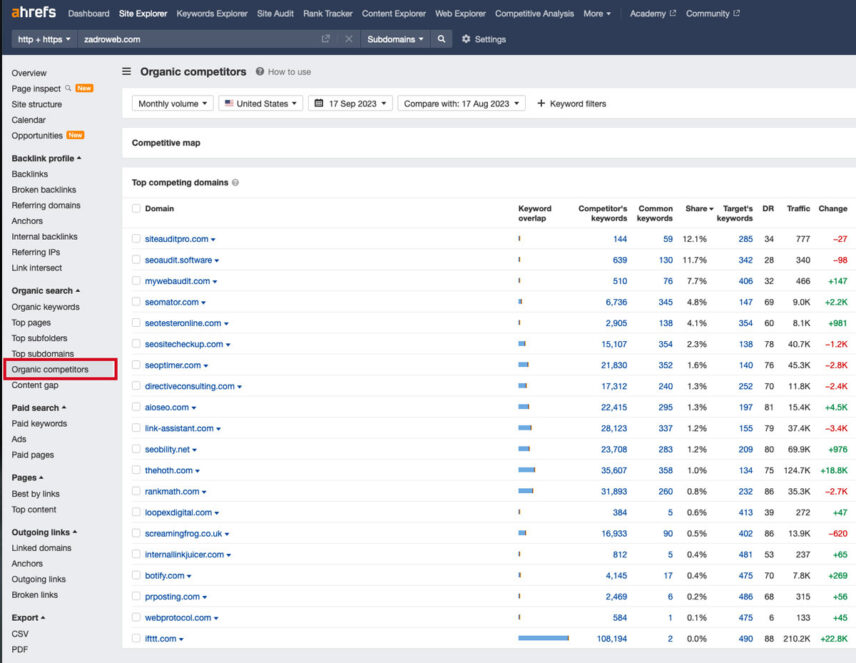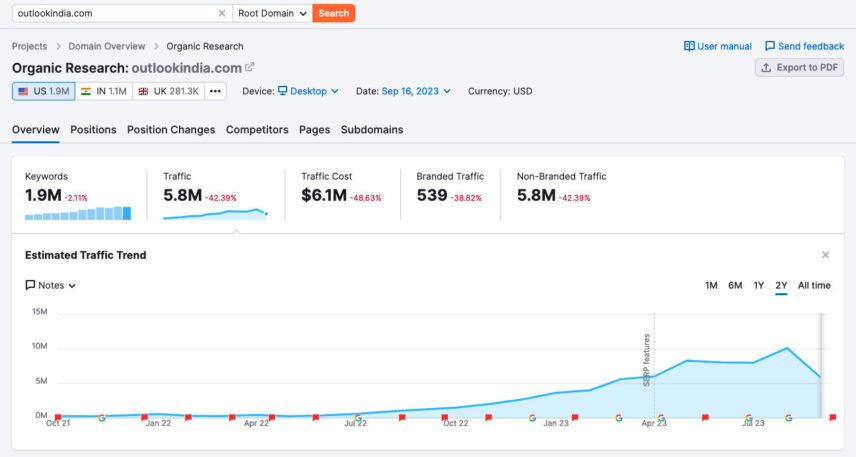There always seems to be so much confusion over link building regarding SEO. Is link building dead? Should you continue with this SEO tactic? Will it hurt your SEO?
I'm here to clarify the confusion and help you build a strong link profile.
In the not-too-distant past, Google's Penguin and Panda made it very clear that low-value and irrelevant links would no longer be effective in boosting a website's search engine performance.
Google needed to clean up the noise all SEOs were creating. Matt Cutts was their answer. Google and Cutts did a great job getting all of us to frantically disavow our links and bow down to them. Not cool.
Expert tip: If you didn't get a message in Search Console, you should NOT disavow.
Link building absolutely works, and it's one of the foundations of any successful SEO strategy. This is 100% fact.
It's simply the approach to building effective inbound links that have changed over the years.
Quality trumps quantity, and a link's inherent value has become more important than ever.
As search engines become smarter and more sophisticated, high-quality links will continue to pave the way to the best content on the web. This includes links from social signals, authority sites, and other resources.
But there's a catch. Search engines look for relevant and trustworthy links and judge a website's link profile according to its overall diversity.
Let me explain.
Trust is Key with Link Building
The first component of a high-quality link profile is the trust factor. Is the page trustworthy?
The value of a link has a direct proportion to its trust. Most people refer to this trust as "authority."
In other words, if you have many links from low-quality domains or websites, you will likely experience poor rankings, maybe even a Google penalty.
Unless you're already a trusted or authoritative site, the negative links don't matter as much. Larger sites tend to get more easily caught up in Google Panda issues.
Large trusted sites are mostly exempt from the rules. They have a massive link profile from others linking to them, which builds their trust and brand. Nevertheless, both large sites and small business needs to understand that trust is very important.
Search engines understand what a quality website looks like. One of the "trust" factors is based on the links pointing to your website.
Think about it. Would an authority website like Huffington Post or Forbes link to a page on your website if your content was bad? Probably not.
Brian Dean does a great job of going over Google Trust -- take a look at that post to learn more.
However, can you pay contributors on authority sites for links? Yes. Should you? Absolutely.
Building "press" is nothing new. Link building is the digital press your website needs from trusted sites for increased rankings and, ultimately, more business.
Let me quickly say that creating exceptional content is a much better way. When combined with a good promotion strategy using outreach, great links will eventually come on their own through "link earning".
So, how do you determine the trust or authority of a website? Google PageRank used to be the standard, but that was completely shut down a few months back. Quite honestly, it has been irrelevant for a few years.
Moz's Page Authority (PA) and Domain Authority (DA) are the de facto standard these days for determining authority. You can use our SEO Auditor to get a quick snapshot of PA/DA.
The higher the numbers, typically the better. Not always, as I'll show later in the SEMRush section.
Relevance of the Website and Topic
Relevance when it comes to link building is very easy to understand.
Is the site you're linking to or getting a link from in the same industry as you? Most of the links should be in the same vertical as you. But it's okay if some are not in a certain context.
For example, attorneys should have links from law resource sites, and Avvo does a great job explaining this topical relevance idea.
[quote]Expert tip: Using an outbound link strategy helps with trust and relevance.[/quote]
Remember that search engines can take this concept a step further into contextual relevance. Is the text surrounding your link relevant to your industry? This is important as well.
In keeping with the attorney example, if your link is from a financial site about retirement planning, and you're an estate attorney, the context will further support the relevance factor.
With relevance, it's not an exact science. Close enough is good, especially if the link has good trust signals.
Inbound or outbound links that further support the topical relevance are very important. The main category or niche of the website can vary.
Let's not forget that high-quality content should always be the cornerstone of your link-building efforts.
Diversity Looks Natural
Diversity is the third key component in a strong link profile. Getting links from various authority domains is important to strengthen your website's link profile.
If we consider each domain or website as an individual voter, it becomes clear that there is more value in ten different domains than in ten votes from a single domain.
A strong link profile should consist of links from several different types of websites. This includes blogs and news sites, social media channels, review sites, and website directories.
However, if the bulk of your links come from only one type of site, say a directory, it doesn't look natural to the search engine bots. You need to diversify.
Having a link profile consisting of links from various domains and a wide range of different types of websites indicates that your link building strategies are natural.
- Directories - Links from directories do work. Some general directories, such as Business.com, are okay, but you really want to find directories that serve your industry.
- Press Releases - This still works as well. Remember that most links will be "nofollow" from PR sites, which helps with diversification.
- Article Databases - These sites I would stay away from. If you have used these types of sites in the past, don't worry about it.
- Blog Commenting - Yes, these are great and natural. It makes sense to have these for an active brand. Vary the link you use, sometimes to your LinkedIn profile, to your blog, and to your homepage.
- Social Links - These types of links go way beyond the natural social profiles you must have with Twitter, Facebook, etc. Get creative and build links on Web 2.0 properties -- everything from Reddit to Github to LiveJournal and hundreds of others. Then, use automation to streamline everything.
- Paid Links - All major brands pay for links. Avoid permanent placement-type links, such as sidebar or footer links.
- Guest Blogs - This should be your primary channel for link building when starting. You will eventually transition to creating that expert content on your own blog.
How to Start Link Building?
Okay, now we understand the big three: trust, relevance, and diversity. Now what?
Like any professional, we first need the right tools for the job. You can use many SEO tools for link building, prospecting, checking traffic, and keyword research.
These are the 3 primary tools I use with SEO and link building:
- Search Console - Used to check for manual actions, crawl errors, sitemap, and more.
- Ahrefs - In my opinion, the best tool to check link profiles.
- SEMRush (Free 14-Day Trial) - Used to check the traffic of your link prospect.
Plenty of other great SEO tools exist, but these are my must-haves.
Anchor Text in a Nutshell
Before we jump into the tools, we need to briefly discuss anchor text. You must be thinking...it's 2023, and we're still discussing anchor text. Yes.
There is so much bad information about anchor text.
Should I only use branded keywords? What is the ratio of "money" keywords I should use?
[quote]Here's the secret: keep it natural![/quote]
You might be wondering what's a "money" keyword.
If we rewind to the attorney example, branded anchor text would look like these variations:
<a href="http://www.abc-attorney.com">ABC Attorney</a> <a href="http://www.abc-attorney.com">ABC Attorney, LLC</a> <a href="http://www.abc-attorney.com">http://www.abc-attorney.com</a>
The last one is technically called a naked URL, but the idea is that branded anchor text flows with your company name and variations of it.
This also includes anchor text links using the owner or other team members (most typically with blog commenting).
Money keywords and anchor text are the ones you would like to rank for, such as:
<a href="http://www.abc-attorney.com">estate planning lawyer</a> <a href="http://www.abc-attorney.com">Chicago estate planning attorney</a>
We all know that the goal of SEO is to rank high in the search results.
A good understanding of anchor text and keyword research is very important. Don't skip this step.
So, how do we keep things natural when we're trying to build links? It's actually very simple.
Would it make sense if your social media sites had "money" anchor text? No, it would not. What about press releases? Again, it's not natural to have anything but branded anchors on both of these.
Now, what about guest posts? It would absolutely be natural to have anchor text that is NOT branded. After all, the writer should link to supporting research in their natural writing flow.
That's the trick. Match the anchor text distribution to the platform. There is no magic percentage of money to branded anchor text you will read on other blogs.
Not 20%, not 5%, not 10%. Those are made-up distribution percentages by people that are just writing about theory and don't really know shit about link building properly.
And large brands? They can do whatever they want. The most important thing for large brands is to clean up their site structure and duplicate pages, have scheduled SEO audits, and respect the search engine's crawling process.
Search Console is Where You Start

Finally, we're on to the tools. First up is Google Search Console.
Formerly Google Webmaster Tools, you must have this platform set up optimally.
Check out this webmaster tools article on how to get started. Once set up, you can dive deeper into the various sections.
Before you start any link building, you must ensure your site doesn't have a "manual action" against it.
Take a look at Security & Manual Actions --> Manual Actions. Make sure you're all good there.
After that, go to Links --> Top Linking Sites.
What does your current link profile look like? Do you have a lot of citations from sites like Yellow Pages and other similar websites?
Are you just starting your link building process? In that case, start with local SEO citations to build a solid foundation.
However, if you already have links in this section, do some stand out that you might not want anymore? If the links are of poor quality, you might want to try and get those links removed manually by reaching out to the site owners.
Understanding where you currently are is the first step to understanding where you want to go. Search Console is the best place to start.
Link Prospecting with Ahrefs
Finding good links can be extremely time-consuming, especially when you're first starting. You already know the first place to build links is with local citations. The next best place is to explore your competitor's links.
Okay, so jump over to Ahrefs and enter your domain, then head over to "Organic Competitors," as shown in this image:

Granted, these top domains might not be an option to fully go after their links, but if you dig deep within those profiles, some links will be very easy to obtain.
You can also go further down the competing domains list and get some smaller footprint domains, and then obtaining links from those competitors becomes increasingly easier.
Just click on the little down arrow next to the domain, then select "backlinks" to check what links they have.
Grabbing competitor links is just one option for link prospecting. You definitely want to use other methods, and make sure you know how to use search modifiers to find other opportunities.
Check out these excellent resources for other methods of link prospecting:
- A Guide to Link Prospecting
- The Power of Using Lists for Link Building
- The Definitive Link Prospecting Resource Guide
Above all, stay VERY organized with your process. This means using Google Spreadsheets or just plain old Excel on your computer.
SEMRush is Gold!
SEMRush (Free 14-Day Trial) is my favorite SEO tool. Not only is it a critical component of your initial keyword research, but it is also a goldmine for evaluating link prospects.
Once you've completed your link prospecting using the methods I mentioned above, now what?
Your next step is to see if the domains are worthy, and this is primarily based on traffic to those domains. You don't want to take the time to get a link only to find out it doesn't get any traffic or was slapped with a Google penalty.
SEMRush is where we go to get a high-level overview of the traffic. Let's look at some examples.

The domain above has been recently hit hard for a link building tactic known as "parasite SEO," and it shows.
The traffic has continued to climb since late 2022, but that downward trendline is not good.
You might wonder what parasite SEO is and if it's a good tactic. Parasite SEO, put simply, is a tactic for leveraging authority sites using sponsored posts to get backlinks. Public Relations (PR) marketing also leverages this type of SEO tactic in many cases. So, you must be careful with your link building efforts.
Once a website like this example gets affected, it can also harm your rankings. Typically, with sponsored marketing, your name is NOT on the article. It is best to stick with guest posting and creating real relationships with articles in your name.
Do you see why SEMRush (Free 14-Day trial) is absolutely critical to your SEO toolset arsenal? You must check all your link prospects, and there's no better place than SEMRush.
In Summary
Link building remains the primary cornerstone of any successful SEO strategy.
Be creative. Experiment with your link building. Don't be scared of Google. But also, don't be careless either.
If you have other indispensable SEO tools or resources when link building, please reach out to see about including it into this post.
Until next time, happy link building.




